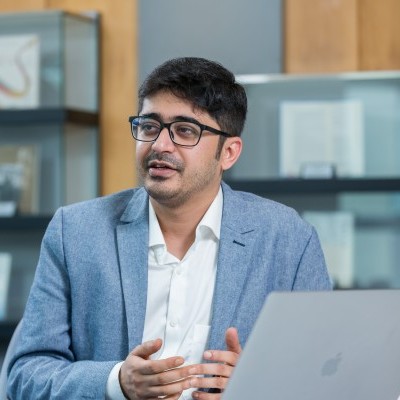
Haziq Mehmood
Following tradition
Most of Haziq Mehmood’s family members are medical doctors, including his father. For Mehmood, it was a given that he would follow the family tradition and he chose to study psychology. As an outgoing person, he enjoys talking to people and the fact that all the different branches of psychology require having interactions with clients greatly influenced his choice.
“I like to speak, give speeches or lectures; that is why I chose industrial organisational psychology,” he says.
After his Bachelor’s degree, he undertook a two-year MPhil programme in industrial organisational psychology. Living in a hostel in Pakistan’s capital Islamabad, he met some science students, who had some friends studying for a PhD in Hong Kong. He got interested in taking this opportunity and the more he found out about Hong Kong, the more he liked it. His friends encouraged him to apply to Lingnan University’s applied psychology programme.
“You can apply to two universities. But, when I found out that the department of applied psychology at Lingnan had three or four professors specialising in industrial organisational psychology, I knew this was the place for me, and I didn’t even bother with a second application,” he says.
Graduate or postgraduate diploma in industrial organisational psychology is becoming more and more popular with employers, as it prepares graduates for a large variety of jobs, such as teaching, giving motivational speeches, working in human resources (HR), such as employee training, and applying their knowledge to the specific HR requirements of a company.
A new topic in industrial organisational psychology is the role of artificial intelligence (AI) in human-computer interaction. It can include experiments in healthcare, such as detecting the chances of computer error in diagnosis and treatment and many other facets of AI’s contribution in our working life.
“Human-computer interaction is very interesting, I didn’t know about this field before,” Mehmood says.
His PhD topic focuses on how using social networking sites during working hours affects employees’ performance and wellbeing. Half of his data was collected in Pakistan and half of it in China, during an exchange programme he joined at Peking University.
He discovered that there are two approaches to the use of social networking sites. Some people would be happy to only use them during a tea break, but for others it is a motivation if they are allowed to stay in touch with others while working.
He also compares the two cultures and finds that Chinese employees are more aware of social networking sites and spend a lot of time on internet shopping. In Pakistan, people are more likely to use the social networking sites at work to watch motivational videos and presentations about management techniques.
Mehmood found the three-month exchange programme very useful and, if not for the help received at Beijing University, he probably would not have been able to collect the data he needed. During his stay in the Chinese capital, it took him a long time to find out that people simply don’t check their emails anymore.
“I was writing to organisations and nobody answered. I was literally in tears,” he says. “When I talked to people, they said: ‘Nobody will answer your emails. They use WeChat for everything.’ First I had to spend some time on figuring this out, then there was the problem of the language.”
He also appreciates the tireless support and great input from faculty, who not only treat them as PhD students, but sometimes as friends and sometimes as children. “They are very concerned about us,” he says.
Being the only student from Pakistan, Mehmood had problems with finding halal food, and sometime he even doubted if he could speak his own mother tongue anymore. His best moment at school was when three more Pakistani students joined in the second year, among them a classmate from his MPhil class from Islamabad.
“For a whole year, I was alone, cooking alone… Now we cook and go out together. The best is that Shenzhen is only 15 minutes from the university,” he says.
Mehmood was teaching and tutoring in his second and third year, for four semesters. He learned a lot about teaching partly from the Learning and Teaching Development course and partly from his professors and hands-on experience.
“After finishing my PhD, I am going to teach, so this experience is going to help me. Getting teaching experience while doing a PhD is a good strategy,” he says.

